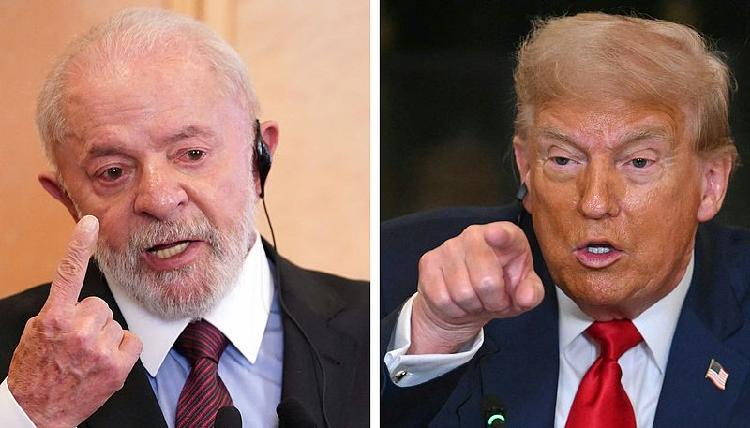INSUBCONTINENT EXCLUSIVE:
Brazilian President Luiz Inacio Lula da Silva said on Thursday that he will impose retaliatory tariffs if U.S
President Donald Trump follows through on a pledge to raise tariffs on the South American country to 50 percent.Lula said he will
trigger Brazil's reciprocity law approved by Congress earlier this year if negotiations with the U.S
fail."We'll first try to negotiate, but if there's no negotiation, the law of reciprocity will be put into practice," Lula said in an
interview with Record TV, citing a law Congress recently passed giving the president powers to retaliate against trade barriers
"If they're going to charge us 50, we'll charge them 50."Lula's comments came after Trump announced on Wednesday afternoon that tariffs of
50 percent will be charged on goods imported from Brazil, effective on August 1.Trump posted a copy of a letter to Lula on Truth Social, his
social media platform, claiming that "Due in part to Brazil's insidious attacks on Free Elections, and the fundamental Free Speech Rights of
we will charge Brazil a Tariff of 50% on any and all Brazilian products sent into the United States."Lula said on Thursday that the
government will set up a committee with Brazilian business leaders to "rethink" the country's commercial policy with the United States.'Lack
of any economic rationale'Trump's letter referenced "unsustainable trade deficits" with Brazil, but official Brazilian figures show a near
two-decade sustained surplus in favor of the United States
Last year, it was almost $284 million.Brazilian Finance Minister Fernando Haddad said on Thursday that over the past 15 years, Brazil has
accumulated a trade deficit exceeding $400 billion with the United States.He argued that the U.S
tariff decision lacks any economic rationale and is instead politically motivated.The United States is Brazil's third-largest trading
partner after China and the European Union
It imports mainly crude oil and semi-finished iron and steel products from the South American powerhouse
Brazil in turn primarily imports non-electric engines and machines, and fuel from up north.Brazilian Agriculture Minister Carlos Favaro said
on Thursday his country will look to expand markets and reduce trade barriers.In a statement, Favaro said he would reach out to key markets
in the Middle East, South Asia and the Global South as alternatives for selling Brazilian exports, adding he would take proactive actions to
create new opportunities for agriculture.The Brazilian Foreign Ministry on Wednesday summoned the charge d'affaires of the U.S
Embassy in Brazil to verify the authenticity of Trump's letter
It later announced the letter would be formally returned, citing its offensive tone and factual inaccuracies.Ideological considerations
tariffsTrump announced the 50 percent tariff on Brazilian imports as he accused the country's leftist leadership of orchestrating a "witch
hunt" against Bolsonaro, dubbed the "Trump of the Tropics."In the Wednesday letter, Trump insisted that Bolsonaro's trial – for allegedly
plotting a coup to hold on to power after 2022 elections he lost – "should not be taking place."Analysts say ideological considerations,
not economics, are behind the U.S
president's actions in defense of Bolsonaro."Brazil came up on Trump's radar now because Bolsonaro's trial is advancing and there are
Republican lawmakers who brought the issue to the White House," Leonardo Paz, a political scientist at Brazil's Getulio Vargas Foundation,
told AFP."It didn't help that the BRICS summit was held in Brazil at a time a narrative exists in the United States portraying the bloc as
anti-Western," said Paz.Meeting in Rio de Janeiro, the group on Sunday spoke out against Trump's "indiscriminate" tariff hikes, prompting
the president to threaten further trade penalties.A member of Lula's entourage told AFP that Trump's attack on Brazil was partly inspired by
"discomfort caused by the strength of the BRICS," whose members account for about half the world's population and 40 percent of global
economic output.Price hike fearsThe 50 percent tariff that the Trump administration has slapped on Brazilian imports has rattled the global
coffee market and could push the price of a cup of coffee in the U.S
jump beyond recent highs.Brazil is the world's largest grower and exporter of coffee, while the U.S
is its biggest client and the world's largest drinker of the beverage, with nearly 200 million Americans having a cup every day.Coffee trade
sources said the new duty announced on Wednesday, if confirmed on August 1, could halt new shipments of Brazilian coffee to the U.S., which
imported 8.14 million 60-kg bags of the product from the South American country in 2024, or 33 percent of its total consumption."A tariff of
this size would all but shut down that flow
Brazilian exporters won't absorb it
roasters can't," said senior coffee broker and consultant Michael Nugent, owner of California-based MJ Nugent & Co.Coffee drinkers around
the world, including in the U.S., are already paying record or near-record prices for the beans after last year's 70 percent price spike
caused by tightening supplies
Arabica coffee futures jumped 1.3 percent on Thursday due to the planned tariff hike.Beyond coffee, more than half of the orange juice sold
comes from Brazil, which exports other products such as sugar, wood and oil.Orange juice futures rose 6 percent in New York on Thursday as
the market fears a squeeze in supply.(With input from agencies)

